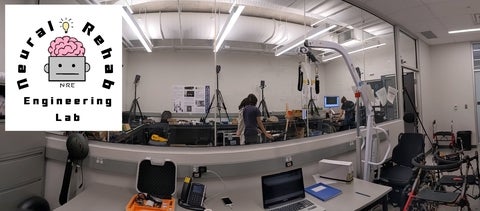
Welcome to the Neural and Rehabilitation Engineering Lab
About us
Human mobility, or moving the body from one location to another, is a fundamental capability that facilitates physical, cognitive, and social health. The Neural and Rehabilitation Engineering (NRE) Lab was established to advance independent mobility for over 3 million Canadian adults living with a mobility disability.
Drawing on knowledge in sensors, signal processing, robotics, and machine learning, the mission of the NRE Lab is to develop and apply novel:
- Methods to measure human motor control in real-world conditions
- Assistive technologies to facilitate mobility and optimize motor rehabilitation
All projects are externally funded, incorporate both clinical and industry partners, and address issues with strong social and economic impact.